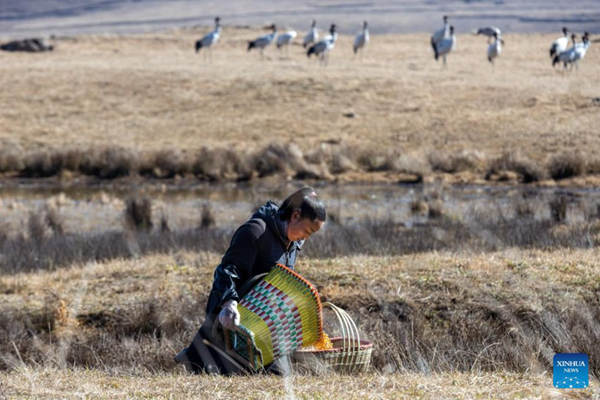 |
| [Xinhua/Cao Mengyao] |
Chen Guanghui is a resident of Zhaoyang, a district in Zhaotong, a city in Southwest China's Yunnan Province. Given her meticulous care of the cranes during the past two decades, Chen has established close relations with black-necked cranes, in Dashanbao Black-necked Crane National Nature Reserve (in Zhaoyang).
Dashanbao has the largest number of black-necked cranes per unit area among China's nature reserves. Dashanbao provides a wintering home and a migration stop for the cranes on the Yunnan-Guizhou Plateau. The black-necked crane, a species of wildlife under special State protection, is referred to as the "bird as precious as the giant panda." The crane is also an endangered species in the world.
"During the early 1990s, my mother-in-law began feeding black-necked cranes in Dashanbao. In 2003, I picked up the 'baton' (of taking care of the cranes) from her," recalls Chen.
Despite the passage of time, she remembers how she eagerly explored ways to get close to the cranes, especially when she began feeding the birds. At first, the "canny" animals kept her at a distance, and they did not eat the food she offered them. "I tried to interact with the cranes by singing folk songs and speaking our local dialect to them, but all my efforts were in vain. Eventually, I found the key to the problem — I whistled to imitate crane's cries, and I fed them at regular hours. Gradually, the cranes grew intimate with me," recalls Chen.
During the cranes' wintering season, Chen counts the number of the birds (in the reserve), and she feeds them every day, regardless if it is rainy, windy or snowy. She is a doctor, who treats sick and/or injured cranes. She is also a guard, who dissuades tourists from "breaking into" the cranes' habitat. "As I treat the cranes as if they were members of my family, I feel empty every time the birds fly away from the reserve," says Chen. "When I'm too old to take care of the cranes, I will pass on my voluntary work (of caring for the birds) to my son."
As Dashanbao has established a food base (for the cranes), and has adopted effective measures to enhance wetland conservation and restoration, the number of cranes wintering on the reserve has increased, year by year, over the past few years. As of November 27, 2022, some 2,260 black-necked cranes had arrived in the reserve for winter, setting a record (in terms of the number of yearly wintering cranes on the reserve) since Dashanbao was established in 1990. The reserve has become the ideal home for wintering black-necked cranes.
(Source: Xinhua/Women of China English Monthly February 2023 issue)